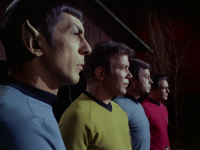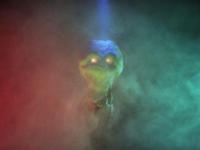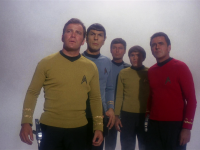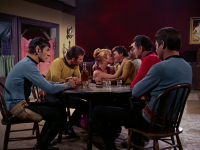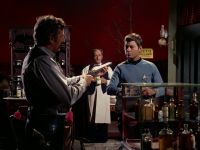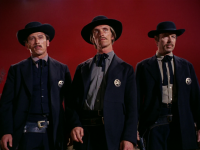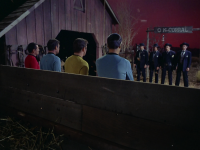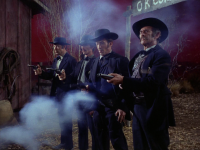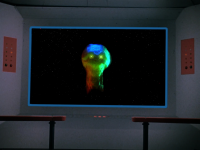Star Trek: The Original Series — 3x06 — Spectre of the Gun
Synopsis
As punishment for trespassing, Kirk and crew are forced to re-enact the shootout at the OK Corral.
Filler rating: good filler
There's no essential plot or exposition in this episode that renders it unskippable, but it's a decent episode, even though it could have been better.
Remarkable scenes
- The probe warning the Enterprise to leave in the native languages of every crewmember.
- Chekov diving into his role.
- Kirk trying to tell the bartender who he really is.
- Kirk trying to tell his enemies who he really is.
- Kirk and his crew trying to leave the city.
- McCoy meeting Doc Holliday.
- Chekov's "death."
- Spock mentally preparing Kirk, McCoy, and Scotty for the battle.
- The crew standing there while the bullets do nothing.
- Kirk regarding Chekov: "Perhaps that explains why he's here. Nothing was real to him except the girl!"
Review
The Enterprise encounters a xenophobic race, brazenly ignores their warnings to go away, and faces the consequences they rightly deserved. Kirk's decision to arrogantly ignore the aliens' wish to be left alone was bad enough, but setting foot on their frigging planet on top of that was downright unforgivable. Though without Kirk's brazen act of trespassing, this wouldn't have been much of an episode, now would it?
That said, this episode is the first to explore the power of illusions in a sufficiently novel way since The Cage and does so just as masterfully, if not better. Unlike The Cage, the landing party is well aware that they're inside an illusion right from the beginning, so the focus is instead on figuring out how deep the illusion goes. The delightfully incomplete nature of the sets reflect this conundrum in a strikingly visual way, as the illusionary town of Tombstone is comprised of fragments of buildings missing most walls, exposed to an eerily alien red sky. I suppose it's pretty obvious that this stylization was a budget saving move, but I'd say it's a well earned one, as it added a surrealist quality to the drama which enhanced the discomfort and out of place feeling that the characters struggled with.
The most striking detail of the story is Spock training the landing party to disbelieve the illusion, thus robbing it of its power. This nice piece of writing manages to be both the episode's most dramatic story point when it climaxes in the gunfight scene as well as the episode's funniest story point when we discover at the end that Chekov hadn't in fact died because he never took the whole situation seriously to begin with. The constant sense of dread the rest of the landing party experiences as the episode builds to its climax was overall well played; I enjoyed seeing them try so many different things to avert their fate with each attempt failing in rapid succession as the clock ticked closer and closer to five o'clock.
Unfortunately for the plot, however, the gunfight at the real OK Corral didn't actually occur at five o'clock. It took place near the hour of three o'clock instead. There were other historical inaccuracies as well. For instance, the gunfight is depicted as taking place just outside the OK Corral, but in reality it took place some good distance away near Fly's Photographic Studio. Also a sign visible in this episode at one point noted Wyatt Earp as the marshal of Tombstone. However it was actually his older brother Virgil instead in reality. Wyatt was only a deputy marshal. Finally Kirk during one part of the episode made a big point about how Billy Claiborne (the character Chekov played) was the only one of their crew to survive the gunfight, but apparently Kirk had forgotten that his own character, Ike Clanton, also survived.
I suppose all of those historical inaccuracies could be chalked up quite easily to the aliens having created the scenario from Kirk's inaccurate recollection of history, but unfortunately nobody else seemed aware of all of these errors either, even despite Spock's apparent expert knowledge of the period. Not all of the errors in the plot logic are confined to historical inaccuracies though. Another notably odd detail was the whole subplot when the landing party refused to trust their illusionary guns so they resorted to trusting the other illusionary resources at their disposal instead, which is a striking error in reasoning because if you can't trust the illusionary guns, why would you think you could trust anything else in that illusionary world?
I was also a bit put off by the scenes when the landing party all mourned Chekov's death. There's a ticking time bomb about to go off in their faces and they're all more interested in talking about their feelings for an extended period of time? How silly. Spock had every reason to be annoyed with them all. A final odd detail of the plot was that curious scene when the alien message is noted as having been broadcasted in the native languages of everyone on the ship. It's implied that the alien telepathy enabled that. However, what I find curious is the fact that the crew could tell the difference between an alien speaking in an alien language with the universal translator translating it as opposed an alien speaking the native language of various crew members. This implies that however the UT works, it isn't entirely seamless. Whenever it's translating an alien language on the fly for you, you can tell when it's working its magic and when it's not.
As for the ending, I felt that it was weaker than The Cage's. In The Cage, the aliens learn something. In this episode, the aliens are just engaging in some bizarre test of the Enterprise's resolve and the plot grants little insight into their motives. By the end of the story a magic switch is flipped and they suddenly go from being xenophobic to welcoming a Federation delegation simply because the landing party saw through the illusionary danger they created. But even though the aliens of this episode were less well conceived than those of The Cage, this episode managed to be a bit more entertaining simply due to all the fun aesthetics and psychological tricks noted above. As such, I would declare this episode the superior story of the two, by a hair.
